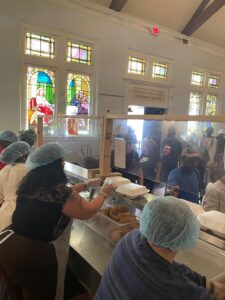Mandy McLaren @mandy_mclaren
THREAD: I filed this story last Thursday, hours before the first night of protests in Louisville. It was published on Monday, but, understandably, I doubt you saw it. Here’s one big reason why I hope you will still find time to read & share.
How the coronavirus pandemic multiplies struggles for Louisville’s disconnected youth Without increased support for the out-of-school, out-of-work young adults, experts fear the worst is yet to come.
Last night, while covering the #LouisvilleProtests, I found myself on East Broadway, under an interstate overpass. And while I was doing my best to capture the powerful demonstration that was unfolding, I turned and locked eyes with a young man.
He wasn’t there to protest. He was just walking by. Instantly, I was jolted by the realization: I knew him.
We met last summer, when I was spending many hours at the YMCA SafePlace drop-in center for homeless youth. Unlike other youths there who knew each other by name & used SafePlace as a spot not just for food and internet, but also social connection, this young man kept to himself.
When I saw him there on Tuesday nights, he typically grabbed a few slices of pizza and sat at a table, always aware of his surroundings. One evening, he asked if it would be OK to sit by me. And little by little, he started talking.
I wish we weren’t in a pandemic right now and I was in the newsroom so that I could dig out my notebook and truly tell this young man’s story with the detail it deserves.
What I do remember clearly is that he had been homeless for quite some time — sleeping, often, in junkyard cars, he said. He talked about having to make sure he woke early, getting out of dodge before the sun rose and was caught trespassing.
He was older than the other youths at SafePlace. He said he had spent a few years in one of the Carolinas — I can’t remember which — where he had a girlfriend, a job and a roof over his head.
But things with the girlfriend didn’t work out. And he felt the tug of Louisville, the city he grew up in, pulling him back. So he returned.
He stayed short on details about what followed once he got back, but it was clear that whatever happened, he was making the choice at the time we met to distance himself from his own family. He told me he was trying to get clean.
I’m not sure the last time I saw him at SafePlace. And at this point, I haven’t been back over there in months, so he could still be stopping by. When I saw him last night, it was clear by his appearance that he was still homeless.
Even though I was wearing a baseball cap and a mask, it was clear he recognized me, too. Over the protesters’ chants, I tried to explain who I was, to see if he understood our connection. He smiled and nodded. Maybe he knew. Maybe he was just being polite.
I said something silly like “Are you OK? Are you safe?” and he nodded some more. Then, with no further conversation possible amid the chaos, we waved goodbye and he continued on his way.
I watched as he, a young black man, walked on, his body directly between the shouting protesters and a line of armed police officers. I wish I knew what he made of it all.
I’m recounting this to you now because if the pandemic and the protests have reminded me of anything, it’s this: Louisville’s disconnected youth are hurting. And whether they’re shouting their pain at a protest or holding it all in, they are counting on city leaders to help.
So again, here’s that story you probably missed: How the coronavirus pandemic multiplies struggles for Louisville’s disconnected youth
Here’s what @louisvillemayor is proposing as a starting point: Mayor Greg Fischer administration seeking $1.5M to support Louisville’s disconnected youth
And here’s the in-depth series I wrote for the @courierjournal last year that brought these important voices to the forefront: Louisville has large number of youth who are out of school or work.









